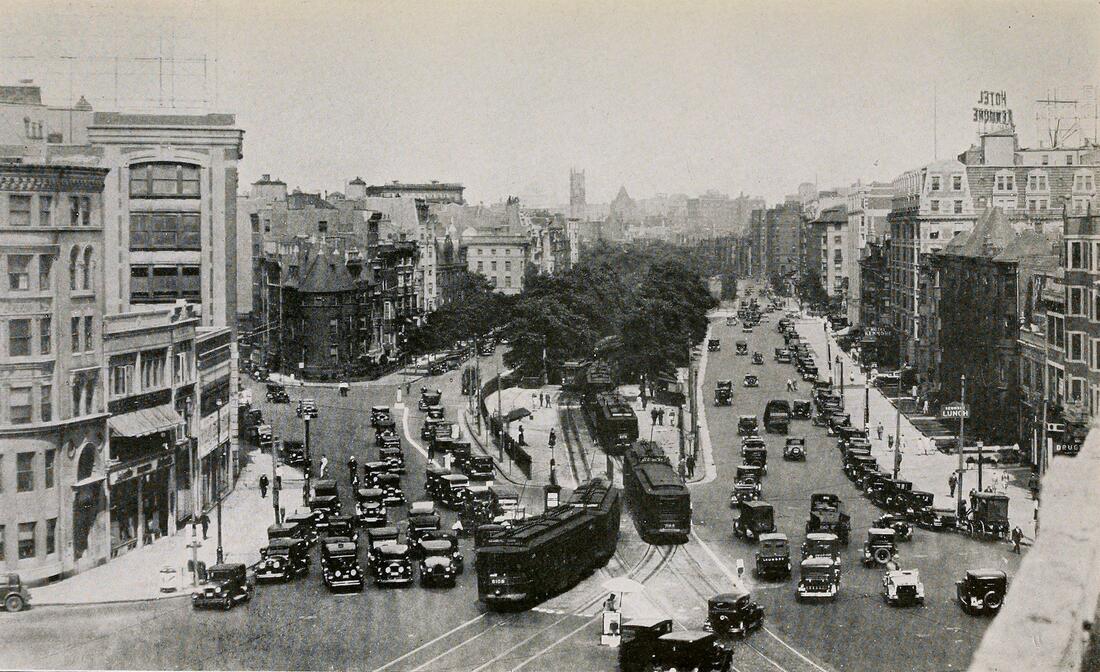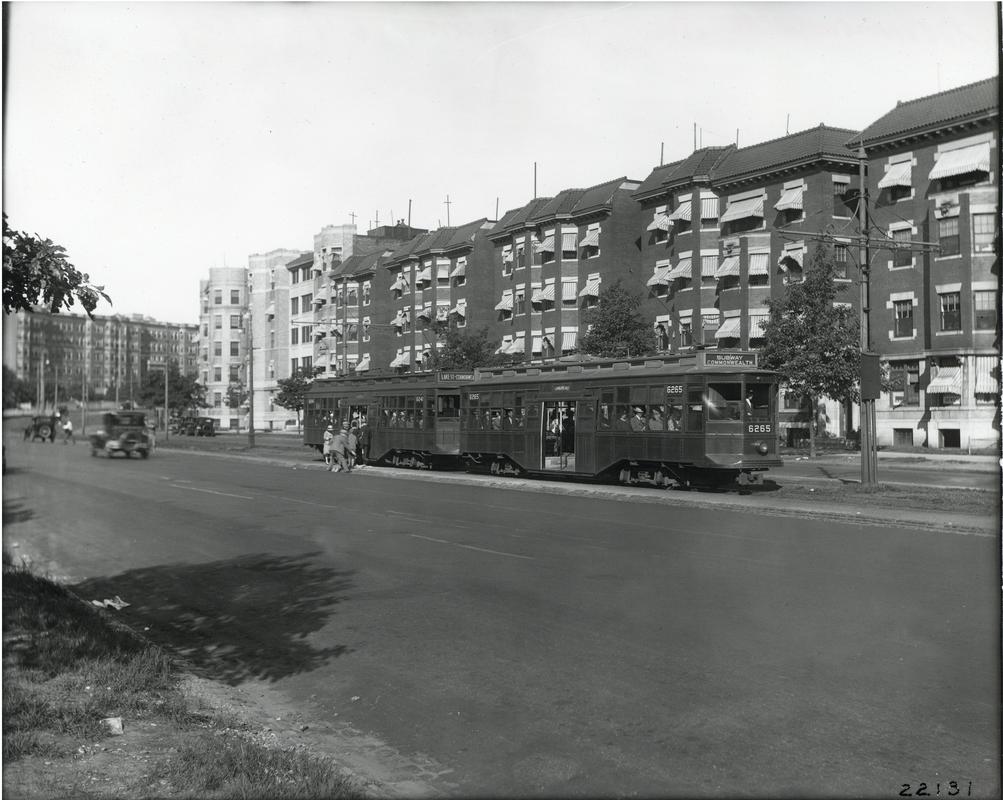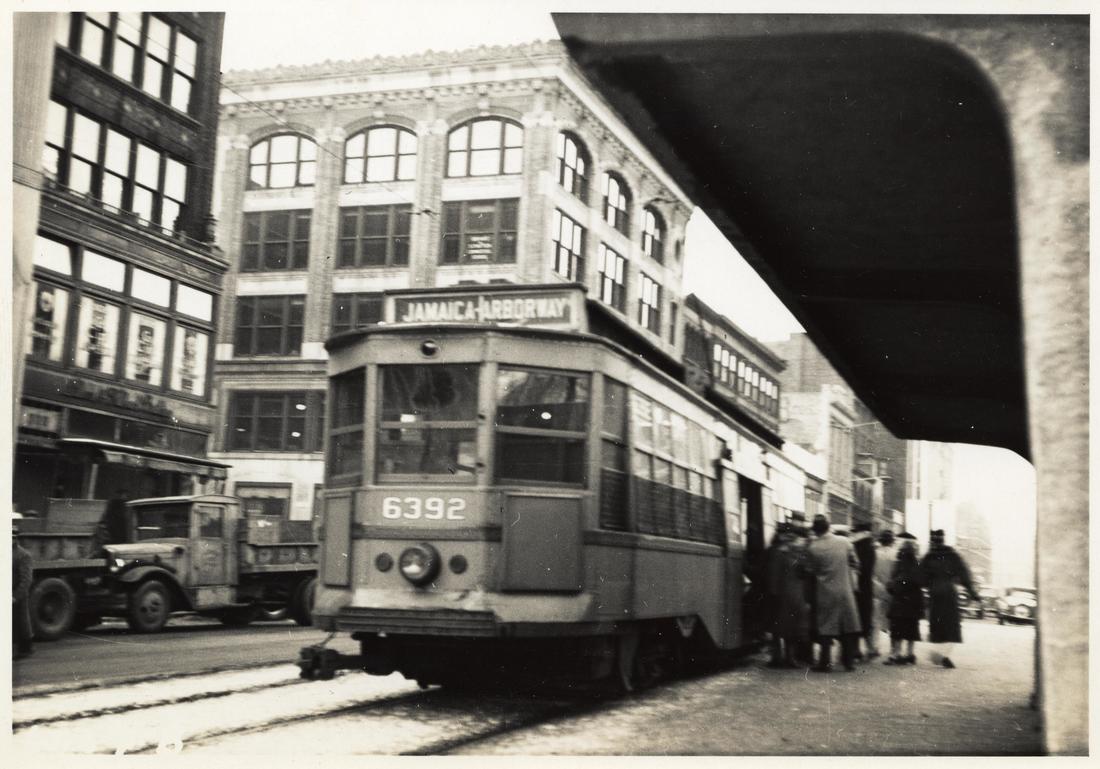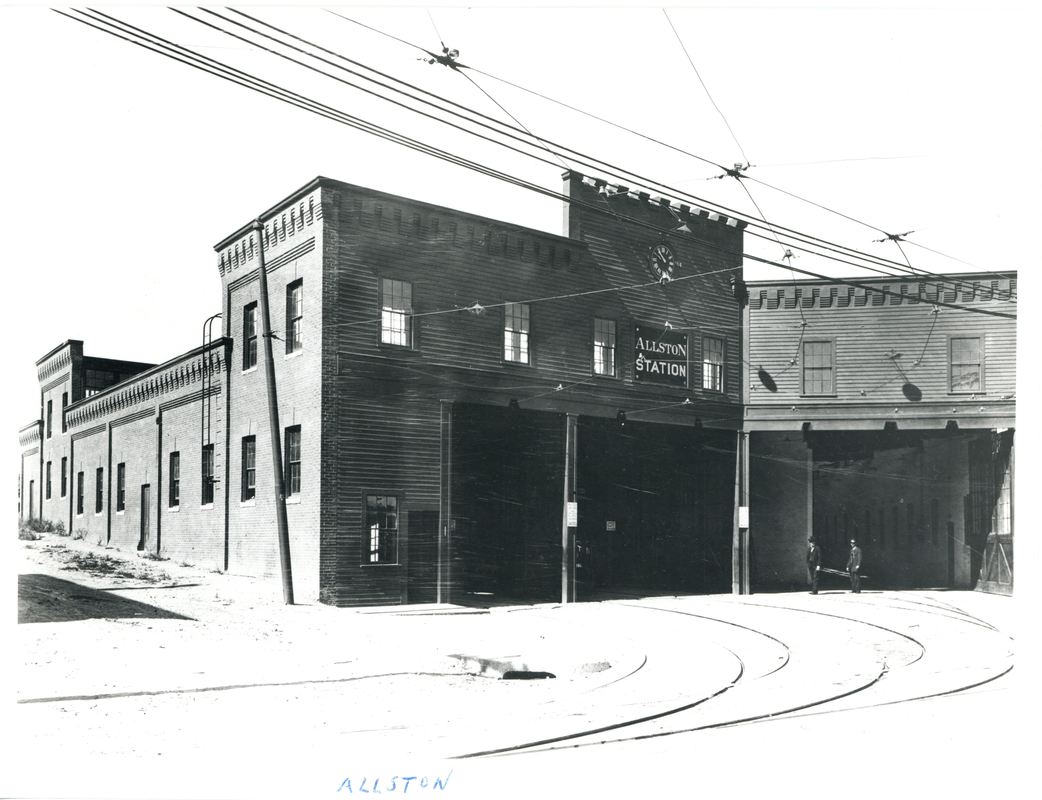|
Rep. Birmingham joined a group of legislators from Brookline and other parts of Boston to protest the removal of the Boston Elevated Railway Company’s emergency crew in Brookline Village, the Boston Globe reported (May 1, 1934, p. 10).
Birmingham and the other legislators appealed to General Manager Edward Dana, who promised a hearing before the Board of Trustees before final action was taken.
0 Comments
 Governor Square (now Kenmore Square) in 1930 Governor Square (now Kenmore Square) in 1930 Rep. Birmingham spoke in favor of a bill to extend the Boylston St. subway under Governor Square (now Kenmore Square) to a place on Beacon St. east of the railroad bridge and to a place on Commonwealth Ave. opposite Temple Israel (Boston Globe, March 20, 1930, pp. 1, 25). The House Committee on Metropolitan Affairs held a March 19 hearing on the bill. The bill was opposed by several municipalities, whose representatives testified that the subway extension would establish a dangerous precedent by requiring outlying cities and towns to contribute to maintenance of a measure intended to solve traffic problems in Boston, not to improve the regional transit system. The bill, they argued, would also compel the municipalities to be responsible for any deficits in the operations of the subway, the paper reported. In support of the bill, Birmingham said that the proposed subway extension was necessary. Corporation Council Samuel Silverman, representing Mayor Curley, testified in favor of the bill, noting that it came out of conference committee composed of Silverman, Boston Elevated representative Frederick E. Snow, and counsel for the public trustees of the road, H. Ware Barnum. Silverman said that the extension would cost $3 million and would be paid for by bonds of the city of Boston, which would contract with the company for annual rental of not less than 4½ percent. Any deficit would be met by the cities and towns in the Metropolitan Transit District; the cities and town would not be reimbursed, he admitted. Rep. Luke D. Mullen of Boston asked Silverman why the bill had not been referred to the Metropolitan Council, which had been established to rule on extensions of the transit system. Silverman said that the committee was concerned that referring the bill to the council would only cause delay.  Center-entrance trams of the Boston Elevated Railway at Griggs Street and Long Avenue in Brighton, 1927 (Source: City of Boston Archives) Center-entrance trams of the Boston Elevated Railway at Griggs Street and Long Avenue in Brighton, 1927 (Source: City of Boston Archives) Rep. Birmingham served on a special committee that was set up to investigate car schedules, car stops, crowded conditions, and other issues with the Elevated Railway Company ('L'), the Boston Globe reported Jan. 4, 1928, p. 19. Other members included City Councillor Edward M. Gallagher, Association President Thomas E. Kiley, Lewis L. Martinson, and Louis Sigismund. The special committee was appointed by the Faneuil Improvement Association to investigate transit in the Brighton district. The Faneuil Improvement Association held a meeting on Dec. 5, 1927, to discuss delays in trolley service between Park St. and Oak Sq., the Boston Globe reported Dec. 6, 1927, p. 16. The Oak Square members said that the trolley running times between Park St. and Oak Sq. can run one hour and 10 minutes, while the trip should take around 35 minutes and can take as little as 25 minutes. Some argued for an express service between the two stops during rush hours. They said that the delays can be caused by short-haul riders who take any trolley car from Park St. In addition, the association was informed that the School Committee proposed to spend $1.25 million for construction of Brighton High School and $100,000 for equipment for the building after it is completed. The associate held its regular meeting on Jan. 3 at the Faneuil Branch Public Library. There were 115 members present at the meeting. At a previous association meeting, members of the public had complained about poor service, crowd conditions, and lack of car stops on the Elevated Railway transit system. In response, the company acted to improve car stop facilities in the district and it assured the association that it planned other improvements suggested by the association. The committee reported that it had studied conditions on various street corners and had made general observations, checking the crowds and counting the cars. The committee concluded that the situation was not as bad as it had been painted, the paper said. Rep. Birmingham, in his first year as Democratic House floor leader, was instrumental in brokering compromise legislation on the future of the Boston Elevated, the Boston Herald reported (June 8, 1929, p. 1, 2).
Birmingham, who was a member of the conference committee that hammered out the compromise, committed himself to ensure the measure’s passage, the paper reported. The compromise, which was pushed by Gov. Allen, dropped the requirement that public control be ended in 1932 and added a provision setting up a metropolitan transportation district in an amendment. The transit district would be managed by a board of five trustees, four appointed by the governor and one by the mayor of Boston. The district would take over the existing structures of the Boston Elevated, subways, tunnels, and other property with takeover to be funded by a bond issue. The Boston mayor and city council would have to approve the takeover of the Boston subways, and the Cambridge tunnel would not be handed over by the state until the Boston subways had been taken over. In addition, the measure called for a non-binding public referendum on the future of the Boston Elevated in the form of three proposals: one would return it to private management, one would maintain public control under private ownership, and a third would transfer it to public ownership. In addition, rapid transit extensions would be decided by the legislature instead of the metropolitan transit district council, according to the bill. The measure would set up a transit council made up of mayors and board of selectmen chairmen, with each community having one vote for every $100 million of valuation represented in the community. The rapid transit extensions would be built by a newly created transit department made up of three members, one to be named by the governor and two by the Boston mayor. The department would replace the current Boston transit board. The bill also calls for the Boston Elevated to negotiate with the Eastern Massachusetts Street Railway Company to buy their lines in Chelsea and Revere. 1930 - Birmingham backs extension of the Boylston subway line beyond Kenmore Square station10/10/2017  Jamaica-Aborway trolley at Boylston Street Portal circa 1940 (Source: City of Boston Archives) Jamaica-Aborway trolley at Boylston Street Portal circa 1940 (Source: City of Boston Archives) Rep. Birmingham testified in favor of a proposal to extend the Boylston subway line beyond Kenmore Square under Commonwealth Avenue and Beacon Street for a cost of $3 million, Boston newspapers reported on March 20, 1930 (JMC Scrapbooks, Vol. 20, pp. 3, 5, 10). During March 19 testimony before the House Committee on Metropolitan Affairs, Birmingham argued that the subway extension was necessary to ease traffic congestion. The bill proposed to extend the Boylston line under Beacon Street to just east of the railroad bridge and under Commonwealth to opposite Temple Israel. On behalf of Mayor Curley, Corporation Counsel Samuel Silverman testified in favor of the bill, saying that the extension was necessary to ease traffic around Governor Square. Silverman said the extension would cost $3 million and would be financed by Boston city bonds. The city would charge Boston Elevated an annual rent of not less than 4.5 percent. Any deficit in in the operation of the subway extensions would be paid for by an assessment on the cities and towns in the Metropolitan Transit District (MTD). This was a point of contention for the surrounding towns in the MTD. Representatives of the Newton, Belmont, Milton, Somerville, and other communities testified against the bill, arguing that it was only intended to ease traffic problems in Boston, and therefore they should not be required to contribute to the extension. Newton City Solicitor Joseph W. Bartlett said that the assessment would set a precedent in which his city might be expected to pay for future subway improvements that did not benefit Newton. Bartlett also argued that subway expansion should be decided by the Metropolitan District Council, instead of through legislation. Belmont Town Counsel Amos L. Taylor agreed, arguing that a decision on the extension should be postponed until voters determined the future ownership of the Boston Elevated, which was scheduled for the fall.  Boston Elevated's Allston Station carhouse (Source: Boston Transit Commission) Boston Elevated's Allston Station carhouse (Source: Boston Transit Commission) Rep. Birmingham and William J. Walsh of Brighton submitted petitions to the legislature proposing the extension of the Boston Elevated rapid transit system to Newton along Commonwealth and Brighton Avenues and Washington St. On Feb. 25, the Legislative Committees on Metropolitan Affairs and Street Railways held a joint hearing on the petitions, according to the Boston Globe (Feb. 25, 1925, p. A11). Testifying in favor, State Treasurer William S. Youngman said that the Newton-Brighton line experienced the most delays of any line of the Boston Elevated system. He said that increased taxation from the growing Brighton population should cover much of the expense incurred by extending the line. Also testifying, Birmingham stated that Newton-Brighton line traffic is delayed at Governor Square, Cottage Farm Bridge, Harvard Ave., and other points along the line. Citing information from the Trustees of the Boston Elevated, he said that the Newton-Brighton line is carrying more traffic than any other line on the system. He added that it takes longer to reach Park St. from Brighton than it did 10 years ago. Birmingham criticized the rapid transit line for “packing people into the cars worse than would be done to animals.” Rep. Martin Hays, a Republican lawmaker also of Brighton, said that the extension was needed because of the rapid increase in Brighton’s population, but he said he would oppose any plan that resulted in a fare hike. He supported taking trolleys out of the subway and using rapid transit trains exclusively underground. He also said that putting in a terminal along Commonwealth Ave. might be a “necessary evil” but residents would rather have a straight ride to Boston. Boston Transit Commission Chairman Col. Thomas F. Sullivan spoke against the proposal, saying it would cost $31 million to implement and would require increasing the fair to more than the current 10 cents. |
Archives
October 2019
Categories
All
|
 RSS Feed
RSS Feed